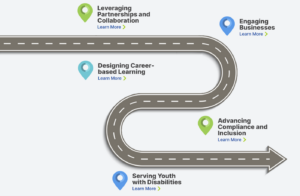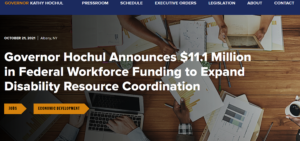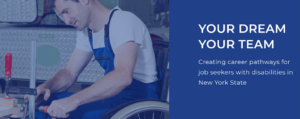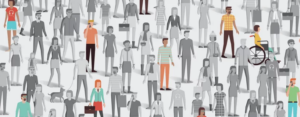Creating Inclusive Career Pathways: Strategies for Success
Explore online tools that provide workforce professionals with resources to help people with disabilities achieve employment and economic self-sufficiency.
In this Issue:
ON TOPIC
Inclusive Career Pathways
The Workforce Innovation and Opportunity Act focuses on creating career pathways for job seekers so they can achieve their desired employment goals and economic self-sufficiency. Inclusive career pathways comprise programs and approaches designed to support people whose career options have been limited for a variety of reasons. Job seekers receive support and accommodations to complete the academic and/or technical requirements for credentialing in high-growth careers.
In this newsletter issue, you will learn about several resources related to inclusive career pathways, including:
• an interactive online tool to help support underserved populations, such as people with disabilities,
• one state’s approach to creating inclusive career pathways,
• an individual’s career pathways success story, and
• webinars on inclusive work-based learning and other related topics of interest.
Inclusive Career Pathways Interactive Tool

The LEAD Center’s interactive, online Roadmap to Inclusive Career Pathways tool provides workforce professionals with resources to support underserved populations, including people with disabilities, in achieving employment and economic self-sufficiency.
The tool contains curated strategies and practices that promote inclusive workforce outcomes.
Five key areas: Best practices align with the career pathways elements, Workforce Innovation and Opportunity Act guidelines, and disability and employment promising practices.
- Leveraging Partnerships and Collaboration—Learn how to build effective partnerships across multiple service delivery systems to improve career pathways inclusion.
- Engaging Businesses—Learn how to actively engage the business sector to identify the skills and support that workers need to grow in particular career pathways.
- Designing Career-Based Learning—Learn how to provide diverse, job-driven training opportunities, including work-based training approaches, such as on-the-job training, summer youth employment, Registered Apprenticeships, internships, and other paid work experience.
- Advancing Compliance and Inclusion—Learn about tools and resources to increase access to services and outcomes for all people, including job seekers with disabilities, people of color, and others who have been historically underserved in the public workforce system.
- Serving Youth with Disabilities—Learn about tools and resources to help increase the participation of youth with disabilities in existing career pathways systems and programs.
Frequently Asked Questions: The Inclusive Career Pathways tool includes frequently asked questions for each subtopic within the five key areas. They address common questions that American Job Center staff may have and highlight a variety of different strategies, practices, target populations, and resource types (e.g., tools, websites, briefs) that are available within the interactive tool.
Check out the LEAD Center’s Roadmap to Inclusive Career Pathways tool to find effective strategies to increase access and participation of job seekers with disabilities.
ON THE GROUND
New York Department of Labor: Creating Inclusive Career Pathways

On October 21, 2021, Governor Kathy Hochul from New York State (NYS) announced a commitment of $11.1 million in federal workforce development funding over three years. Administered by the New York State Department of Labor (NYSDOL), this project will expand the capacity of NYS Career Centers and surrounding workforce programs to serve individuals with disabilities, including those with developmental and/or intellectual disabilities by:
- Funding Disability Resource Coordinators (DRCs) in 30+ Local Workforce Development Areas (LWDAs) to make existing service delivery strategies more inclusive of people with disabilities;
- Providing training and assistance to Career Center staff and partners to support improvements in training and employment outcomes for adults (ages 18+) with disabilities; and
- Promoting systems change.
The project is called the New York Systems Change and Inclusive Opportunities Network, or NY SCION. The word “scion” is a gardening term that refers to the process by which a new plant can be grown from the roots or stalks of an old plant. As such, NY SCION will grow from two of its predecessors: the Disability Employment Initiative (DEI) and the Disability Program Navigator – both of which sought to improve education, training, and employment opportunities and outcomes for youth and adults with disabilities. NY SCION will do the same on a much larger scale.
As it was under the DEI, NY SCION DRCs have credentials in work incentive counseling and benefits advisement to better serve Social Security Administration (SSA) beneficiaries (i.e., those collecting cash benefits, Medicare, Medicaid). They also promote the SSA’s Ticket to Work Program, resulting in increased revenue for each LWDA, which can in turn be leveraged to better serve individuals with disabilities.
NY SCION is still in the midst of implementation; as of August 25, 2022, the NYSDOL team had hired DRCs in 23 out of 33 LWDAs across NYS. The team expected to hire four to five more DRCs before the end of 2022. DRCs are already collaborating – both with their peers and with partners in their respective communities – to develop and implement new and innovative ways to make existing workforce development systems more inclusive of people with disabilities, including the following:
- There are seven DRCs covering 18 counties who have formed a peer-to-peer informal group that gathers to discuss best practices, provide peer support, and plan upcoming events. On August 25, 2022, these DRCs hosted a full-day training seminar in which Niagara University First Responders’ David Whalen provided a “Disability Awareness Training” to 43 representatives from surrounding workforce systems, including the NYS Capital Region, North County, and Hudson Valley.
- Dutchess County is in the process of partnering with IBM and Neurodiversity Hub to form a train-the-trainer model, which should be fully developed by fall 2023.
The NYSDOL Special Populations Team, a small team housed within the agency’s Division of Employment and Workforce Solutions, oversees NY SCION. This team boasts a collective 30 years of disability program management and advocacy experience that will support and assist DRCs for the three-year life of the pilot. The primary mission of these staff members – as well as the DRCs whom they serve – will be to create sustainability of the DRC position across NYS.
Staff from the NYSDOL Special Populations Team can be reached at SpecialPopulations@labor.ny.gov.

Under the New York State Disability Employment Initiative (DEI) Round 8 project, NY Department of Labor and its partners HempsteadWorks, Tompkins Workforce New York, and Chenango/Delaware/Otsego (CDO) Workforce created a web-based career exploration tool: “Your Dream, Your Team.” This resource serves as a career exploration toolkit and checklist for multiple stakeholders and promotes the formation of Integrated Resource Teams, or IRTs. This model was developed in response to the challenge of developing a coordinated approach to service delivery across multiple services systems. IRTs are a national best practice under multiple rounds of DEI projects and will be incorporated into the work of NY Systems Change and Inclusive Opportunities Network (NY SCION).
New York Career Pathways Success Story
Jack learned about the Tompkins County, New York, American Job Center (AJC) via its Summer Youth Employment Program in 2020. He left high school early because he did not like school and did poorly academically, in part because of his attention-deficit hyperactivity disorder (ADHD) and depression diagnoses. Jack enrolled in the Tompkins AJC Workforce Innovation and Opportunity Act Youth Program and worked with a transition workforce specialist. It became clear that Jack needed a job where he could move around and use his hands.
He began a work experience at a local ReUse Center. His first assignment was as a retail sales assistant, but he struggled in that position because it involved a great deal of waiting. His supervisors pointed out that Jack was often on his phone and did not ask for tasks to complete during slower periods in the store. Jack’s transition workforce specialist arranged a meeting with the store manager to identify other potential assignments for Jack that were more concrete and detail oriented. The store manager offered Jack a position testing electronics in the donation-receiving area.
Jack thrived in the second position and completed the 480-hour work experience with near perfect attendance. He expressed that he was much happier and that he felt good about his work. While working, he also attended classes to prepare for his high school equivalency diploma. To allow Jack to explore other career options when his work experience ended, he received additional support from Tompkins AJC staff to participate in on-the-job training (OJT) through a local construction company. Jack also earned his high school equivalency diploma.
Amy Callahan, Jack’s Youth Program Coordinator, shared “Jack joined our program in 2020 with limited job experience. After leaving high school prior to graduating, he struggled to find a supportive work environment due to his diagnosis with ADHD. With support from our staff, he was able to develop the soft skills needed to be successful at work – being on time, keeping to a set schedule, interacting with coworkers, and requesting accommodations to help him navigate a busy work environment. After completing his work experience and OJT with a local construction company, he began a living-wage career in 2022.”
The Promise of Universal Design and its Application to Inclusive Work-Based Learning

In this LEAD Center presentation from the National Career Pathways Network Conference, held November 4–5, 2021, Onondaga Community College (OCC) shared how training in universal design for learning (UDL) for faculty and staff has increased the success of students with disabilities. UDL has allowed OCC to create consistency in coursework, integrate adaptive technologies, and remove learning barriers for all students. The presentation also included information about the Roadmap to Inclusive Career Pathways, which provides workforce professionals with resources to help people with disabilities achieve employment and economic self-sufficiency.
ON CUE
Resources
Updates to State Specific Policies and Data
Check out annual updates on current legislation, executive orders, Medicaid waivers, and policies related to disability employment, as well as vocational rehabilitation rates and services. Explore state specific policies and data for efforts to improve economic outcomes for people with disabilities through competitive integrated employment.
Direct Support Professionals (DSP) Think Tank Recommendations
The U.S. Department of Labor’s Office of Disability Employment Policy and its LEAD Center convened a Think Tank of national experts to identify and make recommendations regarding challenges faced by the Direct Support Professional (DSP) workforce and possible federal actions that could mitigate the challenges. Read the recommendations and background memo “Valuing Women’s Direct Care Work” to learn more about:
- DSP Career Pathways and Training.
- Professionalization of DSPs as a Distinct Occupation.
- Enhancing Wages and Benefits, and
- DSPs as a Career Path for People with Disabilities.
Webinars
In-Depth Q&A Event: Blended, Braided, and Sequenced Funding for Employment, Equity, and Inclusion (August 11, 2022)
This unique Q&A event brought together professionals from Arizona, Colorado, Maryland, North Carolina, and multiple federal agencies to answer your detailed implementation and policy questions related to blending, braiding, and sequencing resources and funding. These best practice strategies support positive employment outcomes, and promote equity and inclusion for people with disabilities.
Direct Support Professional Careers for People with Disabilities (August 31, 2022)
Direct Support Professionals (DSPs) play a key role in supporting people with disabilities in attaining and retaining employment and fully integrating into their communities. In this webinar, experts from the field shared their experiences in creating opportunities for people with disabilities to work as DSPs using customized employment and reasonable accommodations.
Workforce and Bank Partnerships: Tales of Three Workforce Boards (September 27, 2022)
In this webinar, experts from the field shared their activities to engage banks to provide financial coaching, workforce training, credit assistance, career preparation and other activities for adults and youth. This webinar shares strategies to build connections between workforce boards and banks and leverage bank resources. Speakers included Amanda Sutherland from MichiganWorks! Southwest (Kalamazoo, MI); Brian Williams from the Capital Region (Albany, NY); and Nadine Jackson and Doug Saenz from CareerSource Broward (Ft. Lauderdale, FL).
Promising Practices on Diversity, Equity, Inclusion, and Accessibility (DEIA) within the Workforce System (October 27, 2022)
How can we advance equitable workforce practices that support improved outcomes for all participants while simultaneously providing innovative services for employer customers? What does it look like to acknowledge customers’ intersecting identities to meet their unique strengths and needs? This webinar shared some effective state and local practices that promote diversity, equity, inclusion, and accessibility (DEIA) in the workforce system in the areas of business services, internal staff training, and policy implementation.
ON THE HORIZON
Upcoming Webinar
A Roadmap to Inclusive Career Pathways: Promoting DEIA Through Cross-System Partnerships (February 2, 2023)
